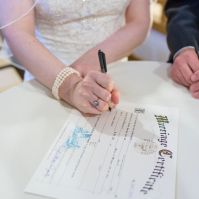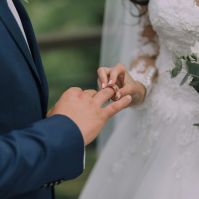
Officiating a wedding brings excitement and responsibility, but legal rules differ in every state. If you plan to officiate outside your home state, understanding the laws ensures the marriage remains legally valid. By securing the right credentials and following the required steps, you can confidently take on this important role.
Who Can Officiate a Wedding?
Each state sets its own rules for who can legally perform a wedding ceremony. Some states maintain simple requirements, while others impose more restrictions.
- Religious leaders, including ministers, priests, and rabbis, can officiate weddings but may need to register with the state or county.
- Judges and justices, whether active or retired, may officiate marriages in many states.
- Some public officials, such as mayors and governors, can perform wedding ceremonies under certain conditions.
- Online-ordained ministers gain recognition in some states, while others require extra paperwork or reject them as legal officiants.
Before officiating, check the specific legal requirements of the state where the wedding will occur.
State-Specific Officiant Registration
Some states require officiants to register before performing a wedding. This process may include providing proof of ordination, a government-issued ID, or an application fee. For example, New York mandates officiant registration with the city or county clerk. Virginia requires non-religious officiants to obtain court approval. Nevada issues a special permit, while Washington, D.C., mandates registration with the Marriage Bureau before officiating a wedding.
Officiants who fail to register where required risk making the marriage invalid, which could cause legal problems for the couple.
Marriage License Requirements
Couples must obtain a valid marriage license from the state where the ceremony takes place. Officiants should familiarize themselves with marriage license regulations.
Some states enforce a waiting period before couples can marry after receiving the license. Others set expiration dates ranging from 30 to 90 days. Some states also require witnesses to attend the ceremony and sign the marriage certificate. The officiant must ensure correct completion of the marriage license and submit it on time to the proper government office. Failing to meet deadlines or following incorrect procedures can lead to legal complications for the couple.
Online Ordination: Is It Recognized Everywhere?
Many individuals become officiants through online ordination services like Universal Life Church (ULC) or American Marriage Ministries (AMM). While many states accept online ordination, others refuse to recognize it.
Tennessee prohibits online-ordained ministers from officiating weddings. Some counties in Pennsylvania reject online ordination, and Virginia requires officiants to obtain court approval before performing a ceremony. Those planning to officiate as online-ordained ministers should thoroughly review the laws in the wedding’s location.
Special Considerations for Destination Weddings
Destination weddings present additional legal challenges. If you plan to officiate in another state or country, you may need specific credentials or government approval. Some locations only allow local residents to officiate, which adds complexity. If the wedding occurs in a country with a different official language, legal documents may require certified translations.
To prevent issues, research officiant requirements early, confirm residency rules, and determine translation needs. Consulting legal experts or wedding planners can help ensure the wedding follows all legal requirements and proceeds smoothly.
Final Steps: Completing and Filing the Marriage Certificate
After the ceremony, the officiant must complete and file the marriage certificate correctly. Accuracy matters, so ensure all names, dates, and locations appear correctly. If the state requires witnesses, collect their signatures. Finally, submit the marriage certificate to the correct government office within the designated timeframe. Failure to file properly can prevent the couple from changing their last names or proving their legal marriage status.
Wrapping It Up: Your Role as an Officiant
Officiating a wedding is an exciting and rewarding experience, but it carries legal responsibilities. Since marriage laws vary by state, officiants must research and follow the regulations in the wedding’s location. Whether serving as a religious leader, public official, or online-ordained minister, following the correct procedures ensures a legally recognized marriage. Proper preparation and legal compliance help officiants support couples as they begin married life with confidence and peace of mind.



